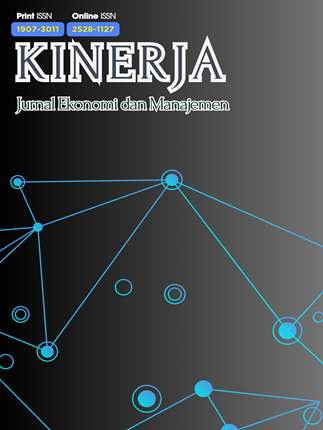The effectıveness of work from home (wfh) agaınst employee performance
DOI:
https://doi.org/10.30872/jkin.v18i3.10040Keywords:
Leadership, competency, training, technology, employee performanceAbstract
The aim of this study is to analyze effective work from home on the leadership, competency, training, and technology to employee performance. The design used is hypothesis testing using Statistical Package for the Social Sciences(SPSS). The population and respondents in this study was manufacturing employee. The results of the study show that the leadership has no significant effect on employee performance with significant = 0.360 and competency has significant affect to employee performance with significant value = 0,036 results on training has significant effect on employee performance with significant 0,005, and technology also has significant effect on employee performance with value of significant is 0,000. The results show that between leadership, competency, training, and technology as together influence employee performance with significant 0,000. Based on result for adjustedR square can be explain at 51,7% is influenced by the four variables (Leadership, Competency, Training, and Technology) to employee performance, the other 48.3% is the contribution of other variables not included in this research. According results testing in this research training, facility and technology significant impact on employee performance. Next research model can be explain with mediating variabel to make sure and increase adjustedR square results for example variabel the role of organizational commitment in organizational structure, organizational strategy and management during Covid 19 new era.
References
Ghozali, I. (2015). Structural Equation Modeling.
Kamar, K., Novitasari, D., Asbari, M., Winanti, W., & Goestjahjanti, F. S. (2020). Enhancing Employee Performance During the Covid-19 Pandemic: the Role of Readiness for Change Mentality. Jurnal Dinamika Manajemen, 11(2), 154–166. https://doi.org/10.15294/jdm.v11i2.25279
Ahmed, Z., Sabir, S., Rehman, Z., Khosa, M., & Khan, A. (2016). The Impact of Emotional Intelligence on Employee ’ s Performance in Public and Private Higher Educational Institutions of Pakistan. IOSR Journal of Business and Management (IOSR-JBM), 18(11), 63–71. https://doi.org/10.9790/487X-1811056371
Gewasari, M., Manullang, B., & Sibuea, A. M. (2017). The Determinant Factors That Effect Teacher Performance of Public Senior High School in Deli Serdang District. IOSR Journal of Research & Method in Education (IOSRJRME), 07(01), 12–21. https://doi.org/10.9790/7388-0701041221
Ginting, J., & Purba, C. B. (2019). The Effect of Principal ’ s Leadership , Discipline and Competence on Teacher Performance in Saint Yakobus Foundation Jakarta. International Journal of Innovative Science and Research Technology, 4(8), 1–12.
Gyasi, R., Xi, W. B., & Ampomah, Y. O. (2016). The Effect of Leadership Styles on Learners’ Performance. The Case of Asonomaso Nkwanta in the Kwabre District Assembly of Ashanti Region in Ghana. Journal of Education and Practice, 7(29), 8–17.
Halawi, A., & Haydar, N. (2018). Effects Of Training On Employee Performance. Evidence. International Humanities Studies, 5(2), 1337–1342. Retrieved from https://core.ac.uk/download/pdf/38098025.pdf
Husna, N. (2017). Pengaruh Disiplin Kerja Terhadap Kinerja karyawan Pada Sman 1 Canduang Kabupaten Agam. Jurnal Sosial Dan Ilmu Sosial, 6(2), 286–298.
Ibrahim, A. A. (2016). The impact of training and development on employee performance (united bottling company case study) in Mogadishu-Somalia. International Journal of Multidisciplinary Research (IJMR), 395(October), 2455–3662.
Omoregie, P. O. (2019). The impact of technology on sport. Sports Technology, 1(1), 1–2. https://doi.org/10.1080/19346182.2008.9648443
Santris, B. (2019). Pengaruh kepemimpinan dan komitmen organisasi terhadap kinerja karyawan dengan motivasi sebagai variabel intervening pada SMA Sutomo 1 Medan. Journal of Accounting & Management Innovation, 3(2), 91–116.
Sendawula, K., Nakyejwe Kimuli, S., Bananuka, J., & Najjemba Muganga, G. (2018). Training, employee engagement and employee performance: Evidence from Uganda’s health sector. Cogent Business and Management, 5(1), 1–12. https://doi.org/10.1080/23311975.2018.1470891
Suseno, I., Supeno, S., & Miranti, I. (2017). Pengaruh Motivasi, Disiplin Kerja dan Gaya Kepemimpinan Kepala Sekolah terhadap Kinerja karyawan Bahasa Inggris SMP DKI Jakarta. Deiksis, 9(01), 90. https://doi.org/10.30998/deiksis.v9i01.906
Rivai, Veithzal dan Ella Sagala, (2013). Manajemen sumber daya manusia untuk perusahaan Rajawali Pers, Jakarta
Sugiyono. (2015). Metodologi Penelitian Bisnis. ALFABETA Bandung.


